The Other Boleyn Girl
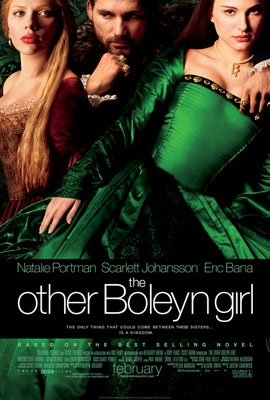
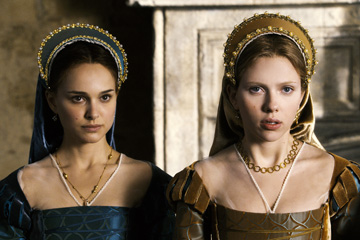 Anne (Natalie Portman) and Mary Boleyn (Scarlet Johansson) are sisters who become divided when their father (Mark Rylance) pressures the family into assisting King Henry VIII (Eric Bana) into creating a male heir to the British throne. With Henry's wife, Queen Catherine (Ana Torrent), unable to give him the son he seeks after many failed attempts, Anne is chosen to become the King's mistress. However, it is Mary who initially captures Henry's attention, and she is quickly drawn into the world of the Royal Family. It is because of this, and a series of other events, that Anne feels betrayed by her sister, and begins to conspire against Mary, and turn the King away from her and the son Mary eventually bears him. The scheming Anne goes even further, convincing Henry to turn his back completely on his marriage to Catherine and marry her, so that Anne herself may be Queen instead of a mere mistress. Anne's own ambitions would eventually prove not only to be her own downfall, but to split her family apart forever.
Anne (Natalie Portman) and Mary Boleyn (Scarlet Johansson) are sisters who become divided when their father (Mark Rylance) pressures the family into assisting King Henry VIII (Eric Bana) into creating a male heir to the British throne. With Henry's wife, Queen Catherine (Ana Torrent), unable to give him the son he seeks after many failed attempts, Anne is chosen to become the King's mistress. However, it is Mary who initially captures Henry's attention, and she is quickly drawn into the world of the Royal Family. It is because of this, and a series of other events, that Anne feels betrayed by her sister, and begins to conspire against Mary, and turn the King away from her and the son Mary eventually bears him. The scheming Anne goes even further, convincing Henry to turn his back completely on his marriage to Catherine and marry her, so that Anne herself may be Queen instead of a mere mistress. Anne's own ambitions would eventually prove not only to be her own downfall, but to split her family apart forever.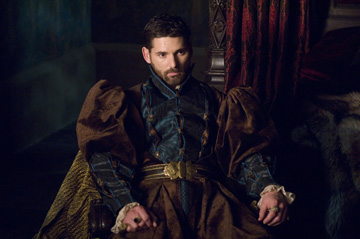 When you strip away the 16th Century English setting, the impressive production values, and the lush costumes and settings, the story of The Other Boleyn Girl almost starts to resemble an episode of Jerry Springer with its themes of infidelity, betrayal, and even incest. Once again, I ask that you do not misunderstand. This is by no means a trashy or simple minded film. There is a complexity lying in the relationship between Anne and Mary. Despite everything that happens, Mary tries her best to stay faithful and loyal to her sister, and keep the family together best she can. It is a tragic story on many levels. It is a story of Anne's own dreams of grandeur leading to her undoing, it is a story of a family destroyed by ambitions of their own, but most of all, it is the story of how both Anne and Mary are manipulated and ultimately betrayed by an unfaithful and insecure King who seems to see the two sisters, and ultimately all of his relationships, as merely means for his own personal desires, and little else. He is only able to show his love when these people are working out for the best for him. As soon as things turn sour in his eyes, or he is distracted by something new, he moves on. You get the sense early on that for all of Anne's scheming and planning, she is wasting her time. And yet, we are not bored, even though we feel like we are ahead of the characters. Anne and Mary are fleshed out and deep characters who have a large variety of feelings and emotions, and they are brought out wonderfully by the screenplay, that seems to savor these personalities, along with their personal desires and insecurities.
When you strip away the 16th Century English setting, the impressive production values, and the lush costumes and settings, the story of The Other Boleyn Girl almost starts to resemble an episode of Jerry Springer with its themes of infidelity, betrayal, and even incest. Once again, I ask that you do not misunderstand. This is by no means a trashy or simple minded film. There is a complexity lying in the relationship between Anne and Mary. Despite everything that happens, Mary tries her best to stay faithful and loyal to her sister, and keep the family together best she can. It is a tragic story on many levels. It is a story of Anne's own dreams of grandeur leading to her undoing, it is a story of a family destroyed by ambitions of their own, but most of all, it is the story of how both Anne and Mary are manipulated and ultimately betrayed by an unfaithful and insecure King who seems to see the two sisters, and ultimately all of his relationships, as merely means for his own personal desires, and little else. He is only able to show his love when these people are working out for the best for him. As soon as things turn sour in his eyes, or he is distracted by something new, he moves on. You get the sense early on that for all of Anne's scheming and planning, she is wasting her time. And yet, we are not bored, even though we feel like we are ahead of the characters. Anne and Mary are fleshed out and deep characters who have a large variety of feelings and emotions, and they are brought out wonderfully by the screenplay, that seems to savor these personalities, along with their personal desires and insecurities.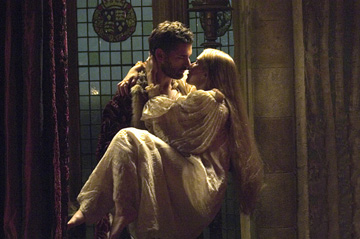 The first half of the film, which concentrates on their relationship with each other and King Henry, is when the film is at its best. It's a gripping, highly entertaining, and involving human drama that doesn't get bogged down in the historical details, and simply lets us savor the characters and their situation. When the film turns its attention away from the characters, and tries to focus on the story, this adaptation of the novel by Philippa Gregory stands on slightly less stable ground. Many of the film's historical details, including Anne's reign as Queen, and the reactions of the King's Court to his actions of marrying another and breaking ties with the Roman church, are glossed over and feel like they're barely touched upon. It seemed to me almost as if a lot of the film during this portion had been filmed then cut, or perhaps left out completely to keep the film's pace up. While this approach prevents the movie from dragging, historical buffs or fans of the original novel, may be disappointed that the movie concentrates almost solely on this bizarre triangle between the King and the two sisters, and little on the story outside of them. Those who are simply expecting an entertaining story and not a history lesson will most likely find this tolerable. What did bother me a little bit more, however, is the fact that King Henry, interesting as he is portrayed in this film, often comes across as little more than a plot device than an actual character. We don't learn much about the reasoning behind his infamous infidelity, nor does he hold as much weight behind his character as Anne and Mary. It is to the credit of Eric Bana, however, that he portrays Henry as a very flawed and insecure man, which makes the character very human.
The first half of the film, which concentrates on their relationship with each other and King Henry, is when the film is at its best. It's a gripping, highly entertaining, and involving human drama that doesn't get bogged down in the historical details, and simply lets us savor the characters and their situation. When the film turns its attention away from the characters, and tries to focus on the story, this adaptation of the novel by Philippa Gregory stands on slightly less stable ground. Many of the film's historical details, including Anne's reign as Queen, and the reactions of the King's Court to his actions of marrying another and breaking ties with the Roman church, are glossed over and feel like they're barely touched upon. It seemed to me almost as if a lot of the film during this portion had been filmed then cut, or perhaps left out completely to keep the film's pace up. While this approach prevents the movie from dragging, historical buffs or fans of the original novel, may be disappointed that the movie concentrates almost solely on this bizarre triangle between the King and the two sisters, and little on the story outside of them. Those who are simply expecting an entertaining story and not a history lesson will most likely find this tolerable. What did bother me a little bit more, however, is the fact that King Henry, interesting as he is portrayed in this film, often comes across as little more than a plot device than an actual character. We don't learn much about the reasoning behind his infamous infidelity, nor does he hold as much weight behind his character as Anne and Mary. It is to the credit of Eric Bana, however, that he portrays Henry as a very flawed and insecure man, which makes the character very human.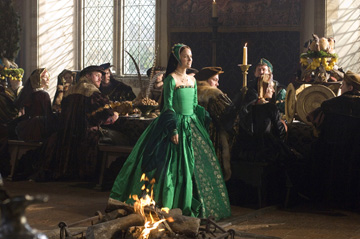 It may seem strange that a film about a famous scandal in the British Royal Family does not contain a single British actor in its three leading roles. Despite the fact that their accents are somewhat shaky at times, Portman and Johansson handle their roles with relative ease, and create powerful individual performances, as well as a compelling relationship. Natalie Portman obviously gets the showier role as the scheming Anne, and is the one who grabs our attention for most of the film. She does not play her character broadly or in an over the top way. Rather, she comes across as a very charming and somewhat over confident woman who thought she had everything in control, and lets her own desires slowly destroy her and everyone around her. It adds a great sense of weight to her performance and the movie itself during her later scenes when the realization of her actions are finally upon her. Scarlet Johansson does leave as overly strong of an impression as the equally beautiful, but slightly more withdrawn and less ambitious Mary. This does not make her performance any less mesmerizing, and in a way, it is the more difficult of the two characters, as she must express most of her emotions solely with her face. She is low-key, but no less memorable as a woman thrown into chaos by members of her own family.
It may seem strange that a film about a famous scandal in the British Royal Family does not contain a single British actor in its three leading roles. Despite the fact that their accents are somewhat shaky at times, Portman and Johansson handle their roles with relative ease, and create powerful individual performances, as well as a compelling relationship. Natalie Portman obviously gets the showier role as the scheming Anne, and is the one who grabs our attention for most of the film. She does not play her character broadly or in an over the top way. Rather, she comes across as a very charming and somewhat over confident woman who thought she had everything in control, and lets her own desires slowly destroy her and everyone around her. It adds a great sense of weight to her performance and the movie itself during her later scenes when the realization of her actions are finally upon her. Scarlet Johansson does leave as overly strong of an impression as the equally beautiful, but slightly more withdrawn and less ambitious Mary. This does not make her performance any less mesmerizing, and in a way, it is the more difficult of the two characters, as she must express most of her emotions solely with her face. She is low-key, but no less memorable as a woman thrown into chaos by members of her own family.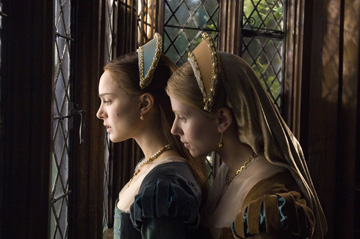
See the movie times in your area or buy the DVD at Amazon.com!






0 Comments:
Post a Comment
<< Home